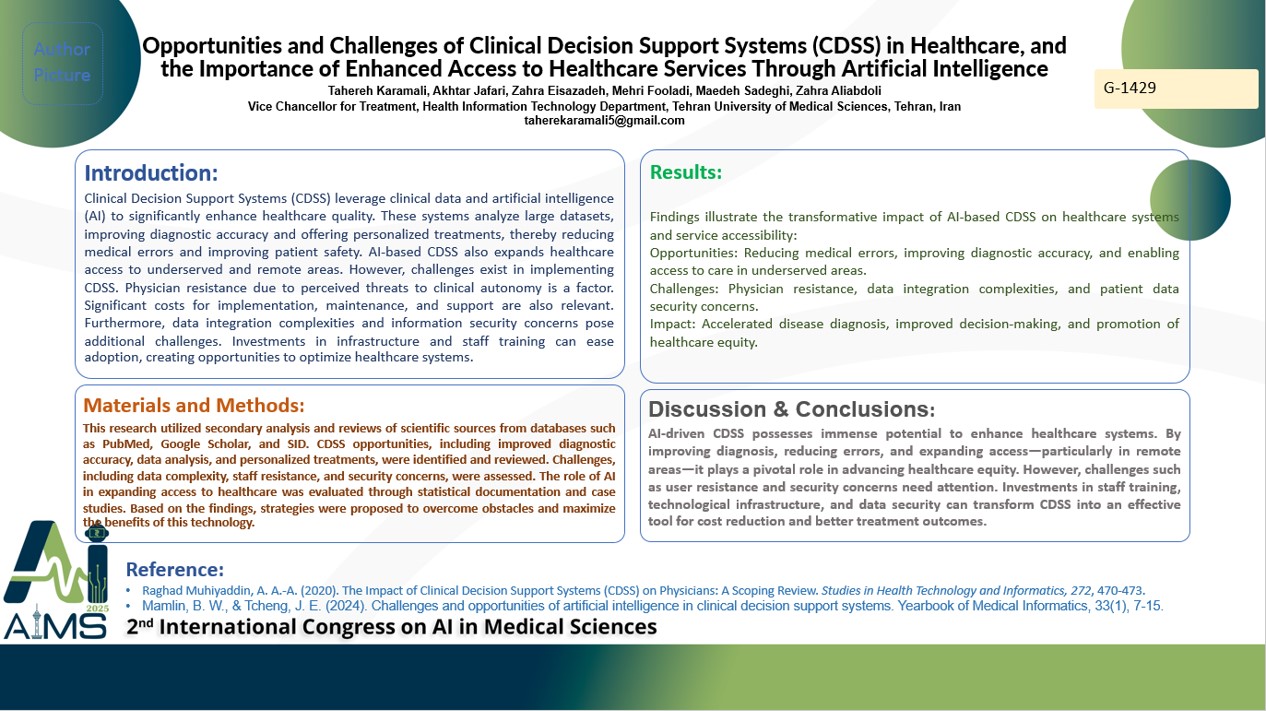Examining Opportunities and Challenges of Clinical Decision Support Systems (CDSS) in Improving Healthcare and the Role of Artificial Intelligence in Expanding Access to Medical Services
Code: G-1429
Authors: Tahereh Karamali * ℗, Akhtar Jafari, Zahra Eisazadeh, Mehri Fooladi, Maedeh Sadeghi, Zahra Aliabdoli
Schedule: Not Scheduled!
Tag: Intelligent Virtual Assistant
Download: Download Poster
Abstract:
Abstract
Background: Clinical Decision Support Systems (CDSS), utilizing clinical data and artificial intelligence (AI), significantly enhance healthcare quality. These systems analyze large datasets to improve diagnostic accuracy and offer personalized treatments, reducing medical errors and improving patient safety. AI-based CDSS also enables healthcare expansion to underserved and remote areas, enhancing access to care. Despite these advantages, implementing CDSS comes with challenges. For instance, physicians may resist it, perceiving it as a threat to their clinical autonomy. Moreover, the costs of implementation, maintenance, and support can be significant. Additional challenges include data integration complexities and concerns regarding information security. Investments in infrastructure and staff training can ease adoption, creating opportunities to optimize healthcare systems. Method: This research utilized secondary analysis and reviews of scientific sources from databases such as PubMed, Google Scholar, and SID. CDSS opportunities, including improved diagnostic accuracy, data analysis, and personalized treatments, were identified and reviewed. Challenges, including data complexity, staff resistance, and security concerns, were assessed. The role of AI in expanding access to healthcare was evaluated through statistical documentation and case studies. Based on the findings, strategies were proposed to overcome obstacles and maximize the benefits of this technology. Results: Findings illustrate the transformative impact of AI-based CDSS on healthcare systems and service accessibility: Opportunities: Reducing medical errors, improving diagnostic accuracy, and enabling access to care in underserved areas. Challenges: Physician resistance, data integration complexities, and patient data security concerns. Impact: Accelerated disease diagnosis, improved decision-making, and promotion of healthcare equity. Conclusion: AI-driven CDSS possesses immense potential to enhance healthcare systems. By improving diagnosis, reducing errors, and expanding access—particularly in remote areas—it plays a pivotal role in advancing healthcare equity. However, challenges such as user resistance and security concerns need attention. Investments in staff training, technological infrastructure, and data security can transform CDSS into an effective tool for cost reduction and better treatment outcomes.
Keywords
ArtificialIntelligence, CDSS, Healthcare, BigData, Personalization, Security
